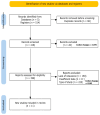Effectiveness of Probiotics, Prebiotics, and Synbiotics in Managing Insulin Resistance and Hormonal Imbalance in Women with Polycystic Ovary Syndrome (PCOS): A Systematic Review of Randomized Clinical Trials
- PMID: 39599701
- PMCID: PMC11597640
- DOI: 10.3390/nu16223916
Effectiveness of Probiotics, Prebiotics, and Synbiotics in Managing Insulin Resistance and Hormonal Imbalance in Women with Polycystic Ovary Syndrome (PCOS): A Systematic Review of Randomized Clinical Trials
Abstract
Background/Objectives: Polycystic ovary syndrome is a common endocrine disorder in women of reproductive age characterized by insulin resistance and hormonal imbalances. Recent research suggests that probiotics and synbiotics may improve these parameters by modulating the gut microbiota. This study systematically reviewed randomized clinical trials evaluating the impact of probiotic, prebiotic, and synbiotic supplementation on insulin resistance and hormonal parameters in women with PCOS. Methods: Exhaustive searches were conducted in PubMed, Cochrane CENTRAL, Scopus, Web of Science, and Embase, following PRISMA guidelines. Randomized trials assessing supplementation with probiotics, prebiotics, or synbiotics for at least 8 weeks in women diagnosed with PCOS according to the Rotterdam criteria were included. Data on participants, interventions, and outcomes related to insulin resistance and hormones were extracted. Results: Eleven studies from Iran involving overweight or obese women aged 15 to 48 were included. Probiotic and synbiotic supplementation showed significant improvements in insulin resistance (reductions in HOMA-IR, fasting glucose, and insulin), lipid profiles (decreased LDL and triglycerides; increased HDL), and hormonal balance (increased SHBG, decreased total testosterone). Synbiotics had more pronounced effects than probiotics or prebiotics alone. Adherence was high, and side effects were minimal. Conclusions: Despite promising results, limitations such as small sample sizes, homogeneous populations, and short intervention durations limit the generalization of the findings. Larger, longer, multicenter trials with diverse populations and standardized methodologies are needed to confirm the efficacy and safety of synbiotics in managing PCOS. Integrating these interventions could improve clinical management and quality of life for affected women, but additional evidence is required to support widespread use.
Keywords: gut microbiota; hormonal imbalance; insulin resistance; metabolic health; polycystic ovary syndrome (PCOS); probiotics; randomized controlled trials; synbiotics; systematic review; women’s health.
Conflict of interest statement
The authors declare no conflicts of interest.
Figures



Similar articles
-
Effects of Prebiotics and Probiotics on Symptoms of Depression and Anxiety in Clinically Diagnosed Samples: Systematic Review and Meta-analysis of Randomized Controlled Trials.Nutr Rev. 2025 Jul 1;83(7):e1504-e1520. doi: 10.1093/nutrit/nuae177. Nutr Rev. 2025. PMID: 39731509 Free PMC article.
-
Synbiotics, prebiotics and probiotics for solid organ transplant recipients.Cochrane Database Syst Rev. 2022 Sep 20;9(9):CD014804. doi: 10.1002/14651858.CD014804.pub2. Cochrane Database Syst Rev. 2022. PMID: 36126902 Free PMC article.
-
Probiotics in infants for prevention of allergic disease.Cochrane Database Syst Rev. 2025 Jun 13;6(6):CD006475. doi: 10.1002/14651858.CD006475.pub3. Cochrane Database Syst Rev. 2025. PMID: 40511642 Review.
-
Synbiotics, prebiotics and probiotics for people with chronic kidney disease.Cochrane Database Syst Rev. 2023 Oct 23;10(10):CD013631. doi: 10.1002/14651858.CD013631.pub2. Cochrane Database Syst Rev. 2023. PMID: 37870148 Free PMC article.
-
Probiotics for management of functional abdominal pain disorders in children.Cochrane Database Syst Rev. 2023 Feb 17;2(2):CD012849. doi: 10.1002/14651858.CD012849.pub2. Cochrane Database Syst Rev. 2023. PMID: 36799531 Free PMC article.
Cited by
-
Effectiveness of Probiotics, Prebiotics, and Symbiotic Supplementation in Cystic Fibrosis Patients: A Systematic Review and Meta-Analysis of Clinical Trials.Medicina (Kaunas). 2025 Mar 12;61(3):489. doi: 10.3390/medicina61030489. Medicina (Kaunas). 2025. PMID: 40142300 Free PMC article.
-
Metabolic disorders in polycystic ovary syndrome: from gut microbiota biodiversity to clinical intervention.Front Endocrinol (Lausanne). 2025 Apr 28;16:1526468. doi: 10.3389/fendo.2025.1526468. eCollection 2025. Front Endocrinol (Lausanne). 2025. PMID: 40357203 Free PMC article. Review.
-
Association of CYP19 gene SNPs (rs7176005 and rs6493497) with polycystic ovary syndrome susceptibility in Northern Chinese women.BMC Med Genomics. 2025 Mar 10;18(1):43. doi: 10.1186/s12920-025-02115-6. BMC Med Genomics. 2025. PMID: 40065436 Free PMC article.
-
Changes in Hormonal Profile and Body Mass Index in Women with Polycystic Ovary Syndrome After Probiotic Intake: A 12-Week Placebo-Controlled and Randomized Clinical Study.Nutrients. 2025 Jan 23;17(3):405. doi: 10.3390/nu17030405. Nutrients. 2025. PMID: 39940263 Free PMC article. Clinical Trial.
-
Probiotic, Prebiotic, and Synbiotic Supplementation for the Prevention and Treatment of Acute Otitis Media: A Systematic Review and Meta-Analysis.Children (Basel). 2025 Apr 30;12(5):591. doi: 10.3390/children12050591. Children (Basel). 2025. PMID: 40426770 Free PMC article. Review.
References
-
- Salari N., Nankali A., Ghanbari A., Jafarpour S., Ghasemi H., Dokaneheifard S., Mohammadi M. Global Prevalence of Polycystic Ovary Syndrome in Women Worldwide: A Comprehensive Systematic Review and Meta-Analysis. Arch. Gynecol. Obstet. 2024;310:1303–1314. doi: 10.1007/s00404-024-07607-x. - DOI - PubMed
-
- Teede H.J., Tay C.T., Laven J.J.E., Dokras A., Moran L.J., Piltonen T.T., Costello M.F., Boivin J., Redman L.M., Boyle J.A., et al. Recommendations from the 2023 International Evidence-Based Guideline for the Assessment and Management of Polycystic Ovary Syndrome. J. Clin. Endocrinol. Metab. 2023;108:2447–2469. doi: 10.1210/clinem/dgad463. - DOI - PMC - PubMed
Publication types
MeSH terms
Substances
Grants and funding
LinkOut - more resources
Full Text Sources
Medical
Miscellaneous

